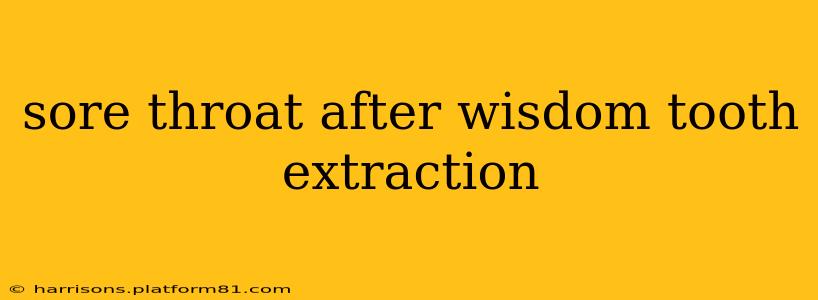Having your wisdom teeth removed is a significant oral surgery, and experiencing a sore throat afterward is quite common. This post will delve into the reasons behind this post-operative discomfort, explore preventative measures, and offer advice on effective treatment strategies. We'll also address some frequently asked questions surrounding this issue.
Why Do I Have a Sore Throat After Wisdom Tooth Extraction?
A sore throat following wisdom tooth extraction is usually a result of several factors, often interconnected:
-
Irritation from the surgery: The surgical instruments and the procedure itself can cause irritation and inflammation in the surrounding tissues, including the throat. The back of your mouth is very close to your throat, making irritation transfer easily.
-
Swelling: Post-operative swelling is normal. As the area swells, it can press against the throat muscles, leading to discomfort and soreness.
-
Dry mouth: Many patients experience dry mouth after surgery, particularly if they're on medication or restricted from drinking fluids. Dryness can irritate the throat and increase sensitivity.
-
Mouth breathing: To avoid disturbing the extraction site, many people breathe through their mouths post-surgery. This can dry out the throat, exacerbating the soreness.
-
Infection: While less common, infection can cause a more severe sore throat. Signs of infection include increased pain, fever, pus, and persistent swelling. Seek immediate medical attention if you suspect an infection.
How Can I Prevent a Sore Throat After Wisdom Tooth Extraction?
While you can't completely eliminate the possibility of a sore throat, these preventative measures can significantly reduce your chances of experiencing one:
-
Follow post-operative instructions carefully: Your oral surgeon will provide detailed instructions on post-operative care. Adhering to these instructions is crucial for minimizing complications, including throat soreness. This typically includes avoiding vigorous rinsing, using prescribed medication, and maintaining proper oral hygiene.
-
Stay hydrated: Drinking plenty of fluids (water, clear broths) helps keep your throat moist and prevents dryness.
-
Avoid smoking and alcohol: Both can irritate the surgical site and increase the risk of infection, potentially leading to a more severe sore throat.
-
Eat soft foods: Chewing can be difficult and may strain your throat, so stick to soft foods that are easy to swallow.
What Are Some Effective Treatments for a Sore Throat After Wisdom Tooth Extraction?
Several home remedies and over-the-counter medications can alleviate a sore throat:
-
Saltwater gargles: Gargling with warm salt water can help reduce inflammation and clean the area. Dissolve ½ to ¾ teaspoon of salt in 8 ounces of warm water and gargle gently several times a day.
-
Over-the-counter pain relievers: Ibuprofen or acetaminophen can help manage pain and reduce inflammation. Always follow the dosage instructions on the packaging.
-
Lozenges or throat sprays: These can provide temporary relief from throat discomfort.
-
Rest: Adequate rest allows your body to heal more effectively and minimizes strain on your throat.
-
Humidifier: A humidifier can add moisture to the air, preventing throat dryness.
Is a Sore Throat After Wisdom Tooth Extraction Normal?
Yes, a mild to moderate sore throat is considered a normal consequence of wisdom tooth extraction. The degree of soreness varies from person to person. However, a severe sore throat, persistent high fever, or signs of infection require immediate medical attention.
How Long Does a Sore Throat Last After Wisdom Tooth Extraction?
The duration of a sore throat varies. It typically lasts a few days to a week, gradually improving as the healing process progresses. If the soreness persists or worsens after a week, consult your dentist or oral surgeon.
When Should I Worry About a Sore Throat After Wisdom Tooth Extraction?
You should contact your dentist or oral surgeon immediately if you experience:
- Severe or worsening pain
- High fever (over 101°F)
- Difficulty swallowing
- Pus or excessive bleeding
- Signs of infection (redness, swelling, warmth around the extraction site)
Remember, this information is for general knowledge and does not constitute medical advice. Always consult your dentist or oral surgeon for any concerns regarding your post-operative recovery. They can provide personalized guidance and address your specific situation.
